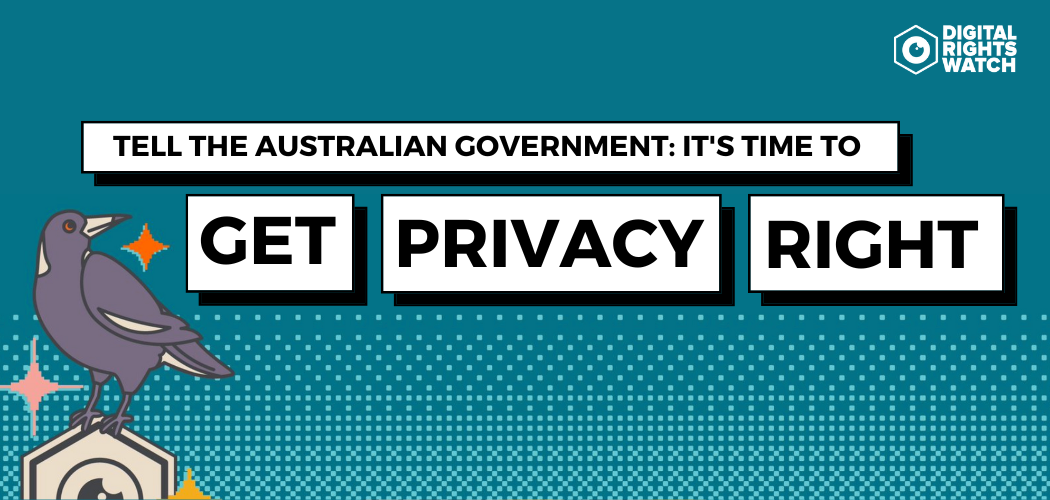
Our right to privacy is essential to uphold our democracy, rein in corporate power, and for a safe and fair digital future. It’s time to get privacy right.
Privacy is a human right, but too many companies and government agencies are getting it wrong.
Australia’s Privacy Act does not adequately protect people’s privacy. It is woefully out of date and unfit for purpose in the modern digital economy. It’s time for the Australian government to bring Australia’s privacy protections into the 21st century.
Invading privacy is big business, and companies will try to weaken these reforms. We need to keep up the public pressure and make sure this chance to secure real privacy reform isn’t wasted.
Join the fight to get privacy right. Here’s what you can do:
We’ve joined forces with a coalition of public health organisations and children’s rights group calling for robust privacy reform to better protect all of us – including children. Add your name to the open letter here. You don’t need to be a parent – guardians, family members and allies are all welcome!
Stay tuned for more opportunities to get involved in the privacy reform campaign – make sure you’ve signed up to our mailing list!
Protecting privacy is important, here’s why
[WPSM_AC id=8520]
Privacy Reform Timeline
- March 2023 – Public consultation on the Report of the Privacy Act Review. Digital Rights Watch hosted a workshop on how to make a submission and wrote an accompanying guide. Over 100 people made a submission using our template, and Digital Rights Watch made our own submission.
- February 2023 – The final report by the Attorney-General’s Department into the review of the Privacy Act was publicly released, including 116 proposals. The AG department opened the report for public consultation until 31 March 2023.
- December 2022 – The Privacy Legislation Amendment (Enforcement and Other Measures) Bill 2022 passed. The maximum penalty for a serious or repeated privacy breach increased from $2.22 million to whichever is greater of: $50 million, 30% of turnover, or three times the benefit obtained from the breach.
- November 2022 – The Privacy Legislation Amendment (Enforcement and Other Measures) Bill 2022 was referred to the Senate Standing Committee on Legal and Constitutional Affairs to conduct an inquiry. Digital Rights Watch provided a submission and appeared at a public hearing on 17 November 2022.
- October 2022 – In response to public outcry following the Optus and Medibank data breaches, the Australian government introduced the Privacy Legislation Amendment (Enforcement and Other Measures) Bill 2022. The key effect is to increase the maximum civil penalties which relate to ‘serious or repeated’ breaches of the Australian Privacy Principles under the Privacy Act. Digital Rights Watch published an explainer on the bill and a blog post on why reform is important, hosted a public campaign briefing event, and published a cheat sheet on getting privacy reform right.
- September 2022 – Optus – Australia’s second-largest telco – is subject to a massive data breach compromising the personal information of millions of people in Australia. Shortly afterward, Medibank also suffered a huge breach, revealing the data of over 9 million customers.
- May 2022 – Federal election – change of government from Liberal-National Coalition to the Australian Labor Party. Mark Dreyfus is appointed the Attorney-General – who oversees privacy reform.
- January 2022 – Public consultation on the Privacy Act Review Discussion Paper closes with over 200 responses. Digital Rights Watch made a submission.
- October 2021 – The Attorney-General’s Department released the Privacy Act Review Discussion Paper for public consultation. __
- October-December 2021 – The Attorney-General’s Department released an exposure draft of the Privacy Legislation Amendment (Enhancing Online Privacy and Other Measures) Bill 2021 (the Online Privacy Bill). The Online Privacy Bill had a strong focus on children’s privacy, and would have required the creation of an Online Privacy Code, to be developed in consultation with Industry. It was met with significant criticism regarding a proposed requirement for social media companies to verify the age of individuals. Digital Rights Watch made a submission. Ultimately the Online Privacy Bill was not introduced to Parliament.
- November 2020 – Public consultation on the Privacy Act Review Issues Paper closes. Digital Rights Watch made a submission.
- October 2020 – The Attorney-General’s Department releases the Privacy Act Review Issues Paper for public consultation.
- December 2019 – The Australian government released a response to the ACCC’s Digital Platforms Inquiry final report, accepting the need for reform.
- July 2019 – The Australian Competition and Consumer Commission (ACCC) releases its Digital Platforms Inquiry Final Report, which included recommendations to reform Australia’s privacy regulations